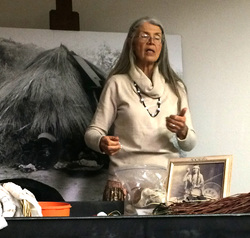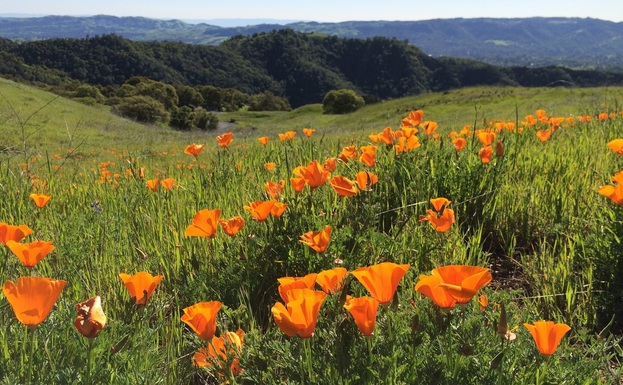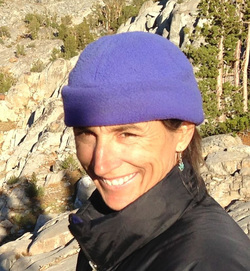Sometimes I suspect that Einstein and I lived in different worlds. His time is the kind that is inexorable. It marches, unchanged and unstoppable. What if, like me, you don’t measure time by the ticking of the clock, by constants and equations, but rather by other signals internal and external? The birds at the feeder. The beginning of another school year. The size of my son’s shoes. The number of gray hairs in the mirror. My time—unlike Einstein’s—sometimes move in fits and starts. It puddles. It sprints.
I changed the kitchen clock this morning, springing forward with the rest of the U.S., balancing tiptoe on our green plaid chair. At that moment, time seemed linear and predictable. After all, I was holding it in my hand and changing it as easily as turning a knob. The front door was slivered open and the susurration of rain outside on the trees and garden played on my ears as gently as the slight breeze around my ankles.
I changed the kitchen clock this morning, springing forward with the rest of the U.S., balancing tiptoe on our green plaid chair. At that moment, time seemed linear and predictable. After all, I was holding it in my hand and changing it as easily as turning a knob. The front door was slivered open and the susurration of rain outside on the trees and garden played on my ears as gently as the slight breeze around my ankles.

The sound was soothing. My sun-dried, wrinkled soul soaks in the rain when the season changes from summer to winter. Winter in California is verdant and colorful, if the rains come. This winter has been wet, unlike the last two. The hills are an Ireland-green, orange poppies crown the roadcuts, redbud grabs the eye, and the purple ceonothus are alive with frantic bees.
Another whispering—not the patter of rain, but something else—danced in through the door and drew me off my chair and onto the front porch, listening. My ears were drawn upwards. The top of the elm tree across the street was in gentle chorus. I smiled and felt an inward calming, a sense that another thread had been woven into the pattern. Maybe I shouldn’t naysay Einstein. The seasons change, the rains begin, the clock springs forward and—look—the cedar waxwings arrive.
A car drove past on the street, windows up, the driver deaf to the symphony above. Compared to some, I'm attuned to natural time. But I know of others who would call me deaf. Yesterday, my son and I were with the Nɨm native people in North Fork, learning about basket-making from the celebrated Lois Conner Bohna. She creates from local, natural materials – redbud, deer grass, bracken fern roots, sedge roots. Lois has an exquisite relationship with these plants, and a sense of natural time that includes all six of her senses. She describes the quest for the perfect redbud stalk—that fall day when icicles hang from redbud branches and tell her the sap is absent and perfect for picking. Harvested now, the red color in the branches will last. Redbud harvested in spring will lose its red color and fade within the year. It is the sixth sense she describes that resonates with me, the calmness of her heart, the nod from her spirits, that tells her the “when” of redbud collecting. Not the calendar. Not the ticking clock.
A car drove past on the street, windows up, the driver deaf to the symphony above. Compared to some, I'm attuned to natural time. But I know of others who would call me deaf. Yesterday, my son and I were with the Nɨm native people in North Fork, learning about basket-making from the celebrated Lois Conner Bohna. She creates from local, natural materials – redbud, deer grass, bracken fern roots, sedge roots. Lois has an exquisite relationship with these plants, and a sense of natural time that includes all six of her senses. She describes the quest for the perfect redbud stalk—that fall day when icicles hang from redbud branches and tell her the sap is absent and perfect for picking. Harvested now, the red color in the branches will last. Redbud harvested in spring will lose its red color and fade within the year. It is the sixth sense she describes that resonates with me, the calmness of her heart, the nod from her spirits, that tells her the “when” of redbud collecting. Not the calendar. Not the ticking clock.
 Lois' basket designs can be seen on her website. Click here.
Lois' basket designs can be seen on her website. Click here.
The animal designs woven into a basket are another aspect of the sixth sense she and other basket weavers in her nakwetɨ share. Once woven, that animal is sacred, to the weaver and to her family. Lois is moved to put rattlesnake designs on her baskets and gambling trays. The consequence is living with rattlesnakes. Her mother was also a basket maker, and Lois grew up with rattlesnakes all over the house… under the beds, on the rugs, under the porch. She remembers sitting on a couch to do homework only to realize that a big rattlesnake was coiled up next to her. Not bothering to get up, she just called her Mom to shoo it away. While her mom and her aunts wove baskets together in the back yard, the rattlesnakes lined up on the slope above them. The women talked to them, telling them to keep their distance. But when the women went in for lunch, the rattlesnakes slithered down to the baskets and curled up inside them.
After thirty years of weaving baskets, Lois has taken a break to follow her love of horses. I never know when my sense of time will cat-step to another rhythm, but like Lois I’m open to change. Perhaps this year’s El Niño, in the middle of an otherwise well-behaved year, is a guide. El Niño isn’t inexorable like the seasons. It pops out of the southern Pacific like a child playing hide and seek, and says “boo" in a voice felt around the world. That’s a powerful break in the cadence of the seasons, in anyone’s sense of time continuum. It’s hard to ignore.
Through the open door, the rain intensifies, the timpani of splatters crescendos, and the sonorous waxwings are literally drowned out. There is standing water in the hollows, a fifth class rapid in the street. The flowers in the garden are battered and akimbo. This last week has been overwhelmingly wet. I step back inside and close the door on the symphony. I pull my turtleneck up over my chin and note that it’s colder inside than out.
I find the last clock to change, on the thermostat. But when I open the electronic panel, it's the temperature display that catches my eye. No wonder I’m cold. Time may be moving on, but the furnace has stopped. I groan as I realize what it means. Under our house, crouched in an earthen depression deepened to make space, our furnace has drowned in rising water. It has happened before, in big-rain winters. There is no predicting the “if” or “when”. I guess this was our lucky year. Until the sump pump wins the battle with the water table and the furnace dries out, we will be wearing sweaters and down.
And so, the season has become unpredictable, the inexorable exorable. And, like every other living thing this winter, as the impact of El Niño ripples over the landscape, I wonder, with an open mind, what will happen next.
After thirty years of weaving baskets, Lois has taken a break to follow her love of horses. I never know when my sense of time will cat-step to another rhythm, but like Lois I’m open to change. Perhaps this year’s El Niño, in the middle of an otherwise well-behaved year, is a guide. El Niño isn’t inexorable like the seasons. It pops out of the southern Pacific like a child playing hide and seek, and says “boo" in a voice felt around the world. That’s a powerful break in the cadence of the seasons, in anyone’s sense of time continuum. It’s hard to ignore.
Through the open door, the rain intensifies, the timpani of splatters crescendos, and the sonorous waxwings are literally drowned out. There is standing water in the hollows, a fifth class rapid in the street. The flowers in the garden are battered and akimbo. This last week has been overwhelmingly wet. I step back inside and close the door on the symphony. I pull my turtleneck up over my chin and note that it’s colder inside than out.
I find the last clock to change, on the thermostat. But when I open the electronic panel, it's the temperature display that catches my eye. No wonder I’m cold. Time may be moving on, but the furnace has stopped. I groan as I realize what it means. Under our house, crouched in an earthen depression deepened to make space, our furnace has drowned in rising water. It has happened before, in big-rain winters. There is no predicting the “if” or “when”. I guess this was our lucky year. Until the sump pump wins the battle with the water table and the furnace dries out, we will be wearing sweaters and down.
And so, the season has become unpredictable, the inexorable exorable. And, like every other living thing this winter, as the impact of El Niño ripples over the landscape, I wonder, with an open mind, what will happen next.

